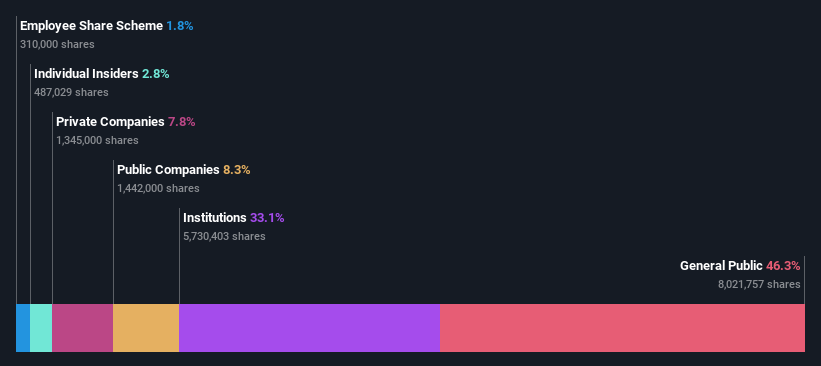individual investors who own 46% along with institutions invested in Okamoto Industries, Inc. (TSE:5122) saw increase in their holdings value last week
Key Insights
- Significant control over Okamoto Industries by individual investors implies that the general public has more power to influence management and governance-related decisions
- 51% of the business is held by the top 19 shareholders
- 33% of Okamoto Industries is held by Institutions
To get a sense of who is truly in control of Okamoto Industries, Inc. (TSE:5122), it is important to understand the ownership structure of the business. The group holding the most number of shares in the company, around 46% to be precise, is individual investors. That is, the group stands to benefit the most if the stock rises (or lose the most if there is a downturn).
While individual investors were the group that reaped the most benefits after last week’s 10.0% price gain, institutions also received a 33% cut.
Let's delve deeper into each type of owner of Okamoto Industries, beginning with the chart below.
Check out our latest analysis for Okamoto Industries

What Does The Institutional Ownership Tell Us About Okamoto Industries?
Institutions typically measure themselves against a benchmark when reporting to their own investors, so they often become more enthusiastic about a stock once it's included in a major index. We would expect most companies to have some institutions on the register, especially if they are growing.
As you can see, institutional investors have a fair amount of stake in Okamoto Industries. This implies the analysts working for those institutions have looked at the stock and they like it. But just like anyone else, they could be wrong. It is not uncommon to see a big share price drop if two large institutional investors try to sell out of a stock at the same time. So it is worth checking the past earnings trajectory of Okamoto Industries, (below). Of course, keep in mind that there are other factors to consider, too.

Okamoto Industries is not owned by hedge funds. Our data shows that Meiji Yasuda Life Insurance Company, Asset Management Arm is the largest shareholder with 8.6% of shares outstanding. For context, the second largest shareholder holds about 8.3% of the shares outstanding, followed by an ownership of 5.0% by the third-largest shareholder. Furthermore, CEO Kunihiko Okamoto is the owner of 1.0% of the company's shares.
Looking at the shareholder registry, we can see that 51% of the ownership is controlled by the top 19 shareholders, meaning that no single shareholder has a majority interest in the ownership.
While studying institutional ownership for a company can add value to your research, it is also a good practice to research analyst recommendations to get a deeper understand of a stock's expected performance. We're not picking up on any analyst coverage of the stock at the moment, so the company is unlikely to be widely held.
Insider Ownership Of Okamoto Industries
The definition of an insider can differ slightly between different countries, but members of the board of directors always count. Company management run the business, but the CEO will answer to the board, even if he or she is a member of it.
Most consider insider ownership a positive because it can indicate the board is well aligned with other shareholders. However, on some occasions too much power is concentrated within this group.
We can see that insiders own shares in Okamoto Industries, Inc.. As individuals, the insiders collectively own JP¥2.4b worth of the JP¥87b company. This shows at least some alignment. You can click here to see if those insiders have been buying or selling.
General Public Ownership
With a 46% ownership, the general public, mostly comprising of individual investors, have some degree of sway over Okamoto Industries. While this size of ownership may not be enough to sway a policy decision in their favour, they can still make a collective impact on company policies.
Private Company Ownership
Our data indicates that Private Companies hold 7.8%, of the company's shares. It might be worth looking deeper into this. If related parties, such as insiders, have an interest in one of these private companies, that should be disclosed in the annual report. Private companies may also have a strategic interest in the company.
Public Company Ownership
Public companies currently own 8.3% of Okamoto Industries stock. This may be a strategic interest and the two companies may have related business interests. It could be that they have de-merged. This holding is probably worth investigating further.
Next Steps:
It's always worth thinking about the different groups who own shares in a company. But to understand Okamoto Industries better, we need to consider many other factors. For example, we've discovered 2 warning signs for Okamoto Industries that you should be aware of before investing here.
Of course this may not be the best stock to buy. Therefore, you may wish to see our free collection of interesting prospects boasting favorable financials.
NB: Figures in this article are calculated using data from the last twelve months, which refer to the 12-month period ending on the last date of the month the financial statement is dated. This may not be consistent with full year annual report figures.
Have feedback on this article? Concerned about the content? Get in touch with us directly. Alternatively, email editorial-team (at) simplywallst.com.
This article by Simply Wall St is general in nature. We provide commentary based on historical data and analyst forecasts only using an unbiased methodology and our articles are not intended to be financial advice. It does not constitute a recommendation to buy or sell any stock, and does not take account of your objectives, or your financial situation. We aim to bring you long-term focused analysis driven by fundamental data. Note that our analysis may not factor in the latest price-sensitive company announcements or qualitative material. Simply Wall St has no position in any stocks mentioned.
 Wall Street Journal
Wall Street Journal